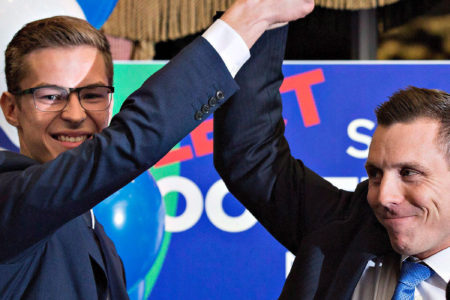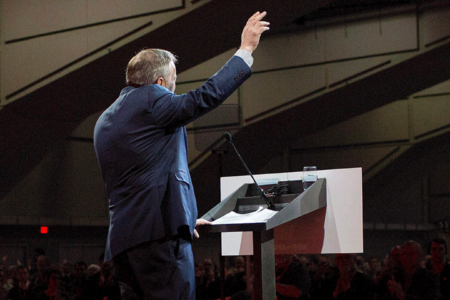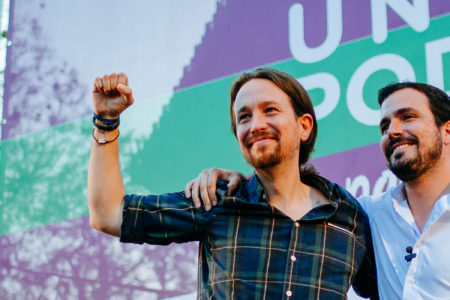
Prime Minister Stephen Harper asked Parliament Tuesday to support an extension of Canada’s military mission in the Middle East to degrade the group known as the Islamic State (ISIS).
Canada’s six CF-18 Hornet fighter jets, two CP-140 Aurora surveillance aircraft, one C-150 refueling aircraft and 600 Canadian soldiers will remain in Kuwait. Less than 100 Special Forces members in northern Iraq will continue to help train the Kurdish peshmerga. What is new is that airstrikes will be expanded to target ISIS in northern Syria.
Minister of Foreign Affairs Rob Nicholson recently made a call for parliamentary unity in a speech to several dozen foreign diplomats. His message was that ISIS poses a double threat: the first is to civilians in the Middle East, the second is to Canada and its allies. Nicholson noted ”œthe plight of innocent civilians ”” women, children and religious minorities ”” is well known.”
Indeed, reports by journalists and human rights organizations have revealed a brutality that knows no bounds: children have been killed, sexually abused and turned into child soldiers, while women have become sexual slaves.
Yet NDP leader Thomas Mulcair opposes the proposed extension. Over the weekend he said ”œIf they [the government] extend [the mission] for a year, despite our opposition to it, yes, when we form government on October 19, we would bring our troops back home,” and that ”œWhen it is a UN mission, when it is a NATO mission, we are open to it. But here, this is an American-led mission,” said Mulcair, ”œWe think it’s wrong for Canada to be involved.”
Trudeau, who last fall opposed the mission and argued Canada should focus its efforts on delivering humanitarian aid to those fleeing ISIS, has been much more silent than Mulcair, in part because he took a major hit in the polls for being seen as weak in confronting the jihadist group. No doubt many Liberals are dismayed by Trudeau’s decision to oppose the mission extension, given that the party played a leadership role in advancing the Responsibility to Protect (a mass atrocity prevention initiative) at the United Nations.
This is interesting because just last week the United Nations issued a report that said ISIS appears to have been carrying out a genocide in Iraq against the Yazidi minority. Like the Kurdish town of Kobane in Syria, many of the Yazidis in Iraq owe their lives to American airstrikes.
The United Nations is not alone in insinuating that fighting ISIS is a ”œjust war.” The Vatican backs military action to prevent ISIS from continuing to massacre religious and ethnic minorities. ”œWe have to stop this kind of genocide,” said Archbishop Silvano Tomasi, the Vatican’s top envoy at the United Nations in Geneva, ”œOtherwise we’ll be crying out in the future about why we didn’t do something, why we allowed such a terrible tragedy to happen.”
As a signatory of the Convention on the Prevention and Punishment of the Crime of Genocide Canada is expected to not turn a blind eye to massive human suffering.
Every generation or so we have witnessed groups emerge, drunk on an ideology based on supremacy and destruction, that eventually aim to put their ideas into action, resulting in the mass slaughter of civilians. ISIS has all the hallmarks of becoming the Khmer Rouge of the early 21st century, save for its ambitions are not confined to one country’s national borders. While the bulk of ISIS’ forces are confined to a sizeable chunk of land in Iraq and Syria, its reach goes much further. Last week it claimed responsibility for the Bardo museum attack in Tunisia that left over 20 people dead. It also claimed responsibility for the bombing of two Shia mosques in Yemen. ISIS is also strongly entrenched in Libya and recently formed an alliance with Boko Haram, the group currently destabilizing Nigeria, Chad and Cameroon. To make matters worse, ISIS has turned social media into a weapon of war and is actively working to recruit new fighters and incite individuals in the West, including Canada, to carrying terrorist attacks.
This week Nobel Prize winning author V.S. Naipaul published an essay in which he warns, ”œISIS is dedicated to a contemporary holocaust. It has pledged itself to the murder of Shias, Jews, Christians, Copts, Yazidis and anyone it can, however fancifully, accuse of being a spy. It has wiped out the civilian populations of whole regions and towns. ISIS could very credibly abandon the label of Caliphate and call itself the Fourth Reich.”
To Mr. Mulcair and Mr. Trudeau: isolationism and humanitarian aid will do nothing to stop ISIS’ atrocities or protect Canada. Religious extremism is the defining issue of our time. Do not wallow in denial for political gain.
This article was originally published on the Canadian International Council’s website www.opencanada.org.







